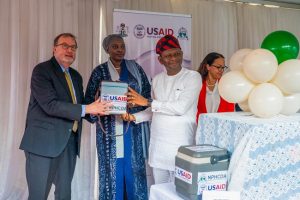The World Health Organisation (WHO) says Nigeria is the first country in Africa to receive mpox vaccines, aimed at combating the spread of the new strain of mpox virus.

WHO in a statement stated that Nigeria received 10,000 doses of mpox vaccines on Tuesday, August 28, 2024.
On Aug. 14 the chief of the World Health Organisation (WHO) declared the rise of mpox, formerly monkeypox, a public health emergency of international concern.
Following his announcement, the chief, Tedros Ghebreyesus, said he was working with partners to facilitate equitable access to vaccines.
The United States government has donated the Jynneos (MVA) vaccine to Nigeria, and it is set to be distributed in five of the country’s states, where the most mpox cases have been detected.
“We are pleased to receive this modest initial donation of the mpox vaccine, which is safe and efficacious,” Nigeria’s Minister of Health, Muhammad Ali Pate, said.
“We will continue to strengthen surveillance and be vigilant to prevent and control mpox.”
The MVA vaccine will be given to 5,000 people most at risk of the virus in a two-dose schedule.
This includes “close contacts of mpox cases and frontline healthcare workers, with a provision for reactive vaccination in other states as the need arises,” according to WHO’s regional office for Africa.
While waiting for the vaccines to be administered, Nigeria’s National Agency for Food and Drug Administration and Control, has approved the vaccine’s emergency use.
“The delivery of the mpox vaccines to Nigeria not only constitutes a crucial addition to the ongoing measures to halt the virus and protect health, but it is also a clear demonstration of international solidarity in the face of global public health emergencies,” Dr Matshidiso Moeti, WHO Regional Director of Africa, said.
WHO’s Africa office says “serious gaps in mpox vaccine access” remain in Africa.
The organisation is working with countries and manufacturers to increase access to the needed vaccines.
Further, WHO is collaborating with partners including the UN Children’s Fund (UNICEF) and others to “enable donations from countries with existing stockpiles.”
The partners are also developing a “donation scheme” to ensure the limited vaccines are used in areas where it is most needed.
WHO’s Africa office is assisting the Nigerian Government to improve “surveillance and contact tracing, laboratory capacity, risk communication, and community engagement” as the country has had 786 suspected mpox cases and 39 confirmed cases as of Aug. 10.
Health officials are also implementing early case detection and diagnostics, as well as increasing cross-border surveillance, notably at main points of entry throughout the country.
By Cecilia Ologunagba
